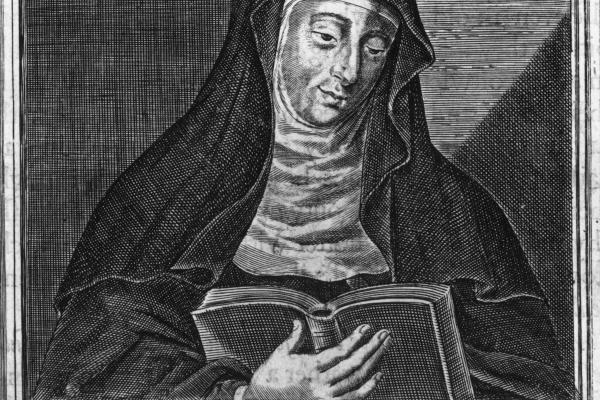Here are two things that don't typically go together: Pope Benedict XVI and feminist culture.
Yet they both share a veneration for Hildegard von Bingen, a 12th-century German nun who was the first woman to be officially recognized as a “prophetess” by the Roman Catholic Church.
On Thursday (May 10), Benedict ordered Hildegard, who died in 1179, to be inscribed “in the catalogue of saints,” thus extending her cult “to the universal church.”
Despite having been considered a saint for centuries, the visionary abbess's sainthood had never been officially recognized. It befell to Benedict, who is rumored to have plans to make her a “Doctor of the church,” to set things straight.
It would be hard to overstate Hildegard's influence on the German-born pope, who has repeatedly turned to her writings and prophecies to explain his vision in the most difficult moments of his pontificate.
In December 2010, he quoted a long passage from one of Hildegard's visions to assess the damage done to the church by the sex abuse scandal, and to invite the Vatican hierarchy to accept this “humiliation” as an “an exhortation to truth and a call to renewal.”
“In the vision of St. Hildegard, the face of the church is stained with dust. ... Her garment is torn – by the sins of priests. The way she saw and expressed it is the way we have experienced it this year,” he said.
A few months earlier, he had referred to Hildegard to address calls for reform inside the church, sparked by the “abuses of the clergy.” Benedict recalled how the saint had “harshly reprimanded” those who in her lifetime wanted “radical reform,” reminding them that “true renewal” comes from “repentance” and “conversion, rather than with a change of structures.”
In both cases, Benedict seemed to draw on Hildegard to get across a key message of his pontificate. For Alessandra Bartolomei Romagnoli, an historian of the Middle Ages at the Pontifical Gregorian University in Rome, this shouldn't be surprising.
“Church leaders have always turned to women at times of profound political and identity crisis. When normal means seem to fail, women's strong, non-institutional faith and voice have always managed to call for an awakening of conscience," she said.
In Hildegard's lifetime, Pope Eugenius III, who needed help fending off the Cathar heresy that rejected the church's worldly power, recognized the authenticity of her visions and authorized her to preach in public -- something that church doctrine had officially forbidden until that time and that nonetheless remains controversial in Catholicism.
Hildegard used her unprecedented role to publicly rebuke the emperor and to call on the pope and bishops to reform the church's ills. “This was extraordinary for the time and, in this respect, feminists are right to consider Hildegard one of their icons,” said Bartolomei Romagnoli.
In the 20th century, feminist scholars such as Rosemary Radford Ruether have recognized Hildegard as an early “Christian feminist.” “It is not surprising then that feminist history and theology have devoted much effort in rediscovering this figure,” historian Lucetta Scaraffia wrote on Thursday in a front-page article in L'Osservatore Romano, the Vatican's semiofficial newspaper.
In 2006, Benedict himself drew on Hildegard to expound his thinking on women's role in the church: not as priests but as bearers of a “spiritual power” that enables them to, yes, even “criticize the bishops.”
Alessandro Speciale writes for the Religion News Service. Via RNS.
Got something to say about what you're reading? We value your feedback!
